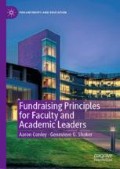Abstract
Each prospective donor is unique and the process of major gift solicitation must be undertaken in this context. Using information from the research on donor motivations and best practices, this chapter provides a framework to apply in developing donor engagement plans that are individualized and strategic. This chapter illustrates the stages of major donor engagement and provides a model for the process of gift solicitation. It reminds academic leaders of the importance of self-awareness in forming communication approaches for development. Successful fundraising efforts require realistic expectations and patience, in an era when time can be a leader’s most precious and sought after commodity.
Access this chapter
Tax calculation will be finalised at checkout
Purchases are for personal use only
References
Brooks, A. W., & John, L. K. (2018, May–June). The surprising power of questions. Harvard Business Review, pp. 60–67. Retrieved July 1, 2020, from https://hbr.org/2018/05/the-surprising-power-of-questions.
Hiles, T. S. (2010). Determining the success of fundraising programs. New Directions for Higher Education; Perspectives on Fundraising, 2010(149), 51–56.
Huang, K., Yeomans, M., Brooks, A. W., Minson, J., & Gino, F. (2017). It doesn’t hurt to ask: Question-asking increases liking. Journal of Personality and Social Psychology, 113(3), 430–452.
Kelly, K. S. (1998). Effective fund-raising management. New York: Routledge.
Lindahl, W. E., & Winship, C. (1994). A logit model with interactions for predicting major gift donors. Research in Higher Education, 35(6), 729–743.
Ragsdale, J. D. (1995). Quality communication in achieving fundraising excellence. In D. A. Brehmer (Ed.), New Directions for Philanthropic Fundraising, 1995(10), 17–31.
Shaker, G. G. (2016). Personal solicitation. In E. R. Tempel, T. L. Seiler, & D. F. Burlingame (Eds.), Achieving excellence in fundraising (4th ed., pp. 363–374). Hoboken, NJ: Wiley.
Washington, B. T. (1900). Up from slavery: An autobiography. Garden City, NY: Doubleday & Company, Inc. Retrieved June 12, 2020, from https://docsouth.unc.edu/fpn/washington/washing.html.
Author information
Authors and Affiliations
Corresponding author
Rights and permissions
Copyright information
© 2021 The Author(s), under exclusive license to Springer Nature Switzerland AG
About this chapter
Cite this chapter
Conley, A., Shaker, G.G. (2021). Engaging Potential Donors. In: Fundraising Principles for Faculty and Academic Leaders. Philanthropy and Education. Palgrave Macmillan, Cham. https://doi.org/10.1007/978-3-030-66429-9_7
Download citation
DOI: https://doi.org/10.1007/978-3-030-66429-9_7
Published:
Publisher Name: Palgrave Macmillan, Cham
Print ISBN: 978-3-030-66428-2
Online ISBN: 978-3-030-66429-9
eBook Packages: EducationEducation (R0)

